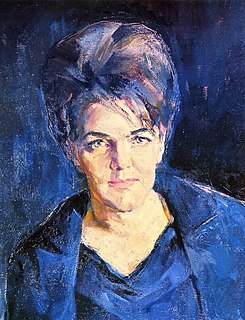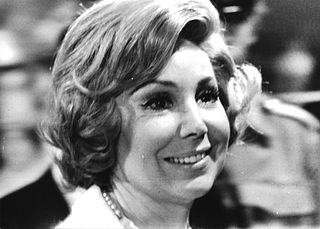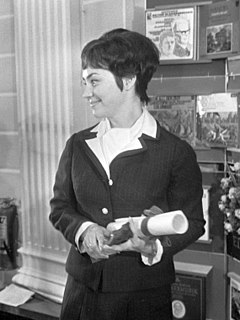Related Research Articles

Bernd Heinrich Wilhelm von Kleist was a German poet, dramatist, novelist, short story writer and journalist. His best known works are the theatre plays Das Käthchen von Heilbronn, The Broken Jug, Amphitryon, Penthesilea and the novellas Michael Kohlhaas and The Marquise of O. Kleist committed suicide together with a close female friend who was terminally ill.

Felix August Bernhard Draeseke was a composer of the "New German School" admiring Franz Liszt and Richard Wagner. He wrote compositions in most forms including eight operas and stage works, four symphonies, and much vocal and chamber music.

Helen Jeanette Donath is an American soprano with a career spanning fifty years.

Leopoldine Rysanek was an Austrian dramatic soprano.

Boris Blacher was a German composer and librettist.
Gerhard Stolze was a German operatic tenor.

Anneliese Rothenberger was a German operatic soprano who had an active international performance career which spanned from 1942 to 1983. She specialized in the lyric coloratura soprano repertoire, and was particularly admired for her interpretations of the works of Wolfgang Amadeus Mozart and Richard Strauss.

Rolf Liebermann, was a Swiss composer and music administrator. He served as the Artistic Director of the Hamburg State Opera from 1959–1973 and again from 1985–1988. He was also Artistic Director of the Paris Opera from 1973–1980.
The Marquise of O is a novella by Heinrich von Kleist on the subject of forced seduction. It was first published in 1808.

Edith Mathis is a Swiss soprano and a leading exponent of the works of Wolfgang Amadeus Mozart worldwide. She is known for parts in Mozart operas, but also took part in premieres of operas such as Henze's Der junge Lord.
Literaturoper, a term coined by the German music critic Edgar Istel, describes a genre of opera that emerged during the late 19th century. When an existing play for the legitimate theatre is set to music without major changes and without the intervention of a librettist, a “Literaturoper” is the result. Although the term is German, it can be applied to any kind of opera, irrespective of style or language.
Heimo Erbse was a German composer from Rudolstadt.
Andrea Breth is a stage director. Breth studied German and English language and literature in the University of Heidelberg from 1970 to 1972. In 1999, she became a resident director at the Burgtheater in Vienna. Andrea Breth grew up in Darmstadt. From 1971 to 1973 she studied literature at the University of Heidelberg. Her first directorial engagements took her to Bremen, Wiesbaden, Hamburg and Berlin, the Zurich Schauspielakademie and the Theater Neumarkt in Zurich. From 1983 to 1985, she was director at Theater Freiburg. Her production of Lorca's The House of Bernarda Alba won her the first of a number of invitations to the Berlin Theatertreffen in 1985. In the same year, Theater heute voted her Director of the Year. From 1986 to 1989 Breth worked at the Schauspielhaus Bochum. Green's Southand Gorki's The Last Ones saw Andrea Breth win her second invitation to the Berlin Theatertreffen. In 1990 and 1992 she directed Kleist's Der zerbrochne Krug at the Burgtheater and O'Caseys The End of the Beginning at the Akademietheater.
Else Rambausek was an Austrian actress and singer.
Marga Höffgen was a German contralto, known for singing oratorio, especially the Passions by Johann Sebastian Bach, and operatic parts such as Erda in Wagner's Der Ring des Nibelungen, performed at the Bayreuth Festival and Covent Garden Opera in London between 1960 and 1975.
Kari Løvaas is a Norwegian operatic soprano who made an international career, mostly using the German spelling of her name, Kari Lövaas, outside Scandinavia. She has performed at international festivals such as the Salzburg Festival and the Lucerne Festival in both opera and concert. She participated in complete recordings of rarely performed operas, including works by Haydn and composers of the 20th century, has recorded Lieder and has regularly appeared in choral concerts.
Die Schule der Frauen is a 1957 German-language opera by Rolf Liebermann after Molière's The School for Wives.
Margarethe Bence was an American opera singer, who sang both mezzo-soprano and contralto parts and was mostly active in German and Austria, including international festivals such as the Bayreuth Festival and the Salzburg Festival. Her repertoire included music from Baroque to contemporary premieres.
Isabel Karajan is an Austrian actress. She is the daughter of Herbert von Karajan and Eliette von Karajan.
The Beethoven Prize of the city of Bonn was an international composition competition. In 1959 Bonn's Lord Mayor Wilhelm Daniels announced the establishment of a Beethoven prize for the best orchestral work of a young composer. No restrictions were made to genre, style and instrumentation of the composition. The prize was given every 3 years, the prize money was 25,000DM. The prize was last awarded in 1992. Other Beethoven Prizes existed also in Vienna and Berlin.
References
- ↑ Richard Chlupaty Antal Doráti: and the joy of making music 2006 - Page 203 Mr Doráti conducted the world premiere of Julietta, a modern opera by Heimo Erbse, West German composer. Mr Doráti was the highlight of the evening, said the critic for Neuer Kurier.
- ↑ Music and Musicians - Volume 8 - Page 19 Evan Senior - 1959 - this year Heimo Erbse's Julietta, an "Opera Semi-seria in Four Acts". It is based on Heinrich von Kleist's novel Die Marquise von O, which tells of a widowed noble lady who finds herself pregnant in circumstances unknown to her, advertises the fact in a local newspaper, and asks the father to come forward in order that she may marry him out of consideration for her family and social obligations. She is, in fact, pregnant as the result of a rape ...
- ↑ Opera 1959 - - Volume 10 - Page 652 The problem of modern music is on everyone's tongue this year at Salzburg: the reason for this preoccupation with a side of music about which Salzburg understands less than nothing is the production of Heimo Erbse's new opera, Julietta. Last year's fiasco with Barber's Vanessa was still very fresh in the minds of audience and critics when the curtain went up on Erbse's lamentable effort. We are grateful to the directors of the Salzburg Festival for their firm decision — in the face of ...
- ↑ A history of the Salzburg Festival Stephen Gallup - 1988 - Page 164 - Save for Liebermann's fairly successful Die S chide der Frauen in 1957, the operas presented — Samuel Barber's Vanessa (the New York Metropolitan Opera production, presented in 1958), Frank Martin's Mysterium von der Geburt des Herrn (1960) and Heimo Erbse's Julietta (1959) — were savaged by the critics and drew small audiences.79 The monumental failure of Vanessa forced critics to rethink their attitude towards modern opera in Salzburg, and many eventually came to von ...